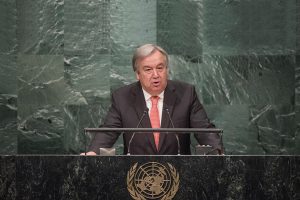27 September 2018: Announced at the One Planet Summit in 2017, the Carbon Neutrality Coalition held its inaugural high-level meeting in the margins of the 73rd session of the UN General Assembly (UNGA 73). Convened by the Governments of New Zealand and Marshall Islands, the event welcomed new members, highlighted the Coalition’s goals and described countries’ initiatives to achieve carbon neutrality by 2050.
Coalition members aim to “achieve a triple win:” reaping the socioeconomic benefits of the transition to net zero greenhouse gas (GHG) emissions; building climate-resilient economies; and accelerating global climate action at the necessary speed and scale.
Moderating the discussion, Christiana Figueres emphasized the need co-create a carbon-neutral world by 2050. Her words were echoed by participants who underscored the importance of building solidarity and a collective narrative that allows leaders to point to other countries’ initiatives as a means of building political will among constituencies at home.
New Zealand Prime Minister Jacinda Ardern called for “a strong wind of change,” saying that we are pushing forward on an agenda “that should not be voluntary.” She underscored the value of creating a club that can share examples and advocate together for stronger climate policies and actions. Describing New Zealand’s actions, Ardern reiterated that climate change recognizes neither borders nor wealth.
Marshall Islands President Hilda Heine outlined her country’s policies and actions on climate change. She called on all to increase the ambition of their nationally determined contributions (NDCs) under the Paris Agreement on climate change by 2020 to deliver a carbon-neutral world by 2050.
While the Coalition may be distinguished, it is not exclusive.
Vice President of Costa Rica Epsy Campbell Barr outlined how decarbonization can take place in tandem with economic growth, highlighting that her country was run on renewable energy for 334 days last year. Her remarks were followed by statements from Iceland, Ethiopia, France, Germany, Finland, Norway and Mexico, as well as new members: the UK, Denmark, Spain and Canada.
UNFCCC Executive Secretary Patricia Espinosa urged members to lead work that cuts across all actors and sectors of society. She recognized the difficulties of moving “from negotiations to reality,” but noted the relevance of the Coalition in increasing the awareness and relevance of carbon neutrality in the lead-up to the UN Secretary-General’s 2019 Climate Summit.
Sweden’s State Secretary Eva Svedling summarized the Carbon Neutrality Coalition’s Plan of Action, which focuses on four areas:
- demonstrating and showcasing the benefits of long-term, low-emissions, climate-resilient development strategies;
- providing leadership through the exchange of experiences, information, tools and case studies towards carbon neutrality;
- advocating for increased global ambition on mitigation; and
- encouraging further membership from countries and the alignment of subnational and non-state actors with the objectives of the Coalition.
Figueres closed by reviewing the key themes raised by participants: equal responsibility and equal duty of care; the importance of carbon neutrality in guiding both policy and investment; making economies modern, inclusive and green; and triggering a race to the top. Emission reductions, she highlighted, are the basis for – and not a threat to – economic growth and prosperity. She noted that, while the Coalition may be distinguished, it is not exclusive.
The Carbon Neutrality Coalition’s current members include Canada, Costa Rica, Colombia, Denmark, Ethiopia, France, Finland, Germany, Iceland, Luxembourg, the Marshall Islands, Mexico, the Netherlands, New Zealand, Norway, Portugal, Spain, Sweden and the UK, as well as 32 cities. Twelve of the 19 members are EU member States. [Carbon Neutrality Coalition Launch Webcast] [Carbon Neutrality Coalition Declaration and Plan of Action]


